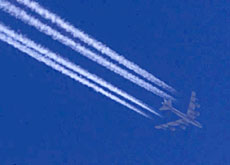US to target Saddam

The United States-led attack on Iraq could be over within weeks, according to a top Swiss military strategist.
But Albert Stahel believes civilian casualties will be an unavoidable consequence of a US push towards Baghdad in search of Saddam Hussein.
In an interview with swissinfo before the war started, Stahel said the invasion would take the form of a major ground offensive, but not before the US military has completed a strategic and targeted bombing campaign of key Iraqi installations.
“Targeted bombing using air power is a blow against strategic [infrastructure],” Stahel commented.
Stahel – a professor at the Swiss Military Academy in Zurich – said Washington was likely to set its sights during the first hours and days of its military offensive on the destruction of Saddam’s palaces.
“The bombing of the presidential palaces is certainly not a problem, since they know exactly where they are… But the problem is that Saddam will certainly not be in the palaces.”
“The dilemma for the British and Americans… is how to find Saddam in one of his bunkers and how to destroy him.”
Thursday’s opening strike by stealth bombers and cruise missiles in the vicinity of Baghdad appeared to have been a direct attempt to remove Saddam and key colleagues.
On the ground
Military experts believe the US will follow up an initial bombing campaign with a series of attacks against specific concentrations of Iraqi troops.
“There will be attacks against the division of the [elite] Republican Guard [as well as] attacks with US marines and the army from Kuwait [in the south],” said Stahel.
Stahel estimates that around 200,000 US and British troops are likely to be deployed on a mission to reach – and capture – Baghdad.
He added that the ground offensive is likely to begin just one or two days after the bombing of strategic targets.
Targeting infrastructure
One of Washington’s key priorities in the first stage of its campaign, said Stahel, will be to target and paralyse the country’s infrastructure as a prelude to taking control of Baghdad.
“The first move is to break down the energy supply for the Iraqi army and also for the whole country.
“By targeting power stations, they also destroy the water supply for Saddam’s forces as well as for the population as a whole, and there will be a movement [of people] out of Baghdad, which means there will be chaos.”
In Stahel’s view, loss of life is inevitable as civilians begin to flee Iraqi cities.
“The breakdown of the electricity and water supplies, as well as fighting in the streets, mean that there will be casualties, and depending on how long the war goes on, there could be 2,000, 4,000 or more.”
Different to Desert Storm
President Bush’s priorities in attacking Iraq, argues Stahel, are very different to those of his father, who launched Operation Desert Storm more than a decade ago in response to Iraq’s 1991 invasion of Kuwait.
“There are different priorities compared with the last Gulf War. In ‘Desert Storm’ we saw heavy bombing against Iraqi troops in Kuwait,” he told swissinfo. “But this time we are seeing a more strategic bombing, followed by a push of ground forces towards Baghdad.
“Also, this time the operation is not only located around Kuwait… It is a major move with the objective of controlling the entire country,” Stahel added.
Military strategists also believe that Iraqi troops are weaker and likely to be less effective in retaliating against an attack than they were over a decade ago.
“The Iraqi army does not have the same strength, it is poorly equipped and morale is low,” Stahel said.
Timetable for war
Few experts are willing to predict with any certainty when the war may draw to a close, but Stahel said it would be optimistic to believe the offensive will last less than two weeks.
“If there are other factors like the difficulty of locating Saddam, the blowing up of oil fields or the use of chemical weapons, it could go on for four to six weeks… but probably no more than two or three months.”
Stahel admits that the nature of war and the inevitable period of confusion which follows its declaration make it difficult to draw accurate conclusions about the direction the offensive will take.
But he argues that the US cannot avoid losing some of its own troops in battle.
“If chemical weapons are not used, we can expect something like 300 or 400 [American and British] casualties… but if they are used, it could be much more.”
swissinfo, Ramsey Zarifeh
Swiss military strategist Albert Stahel predicts the US strike on Iraq could be over within weeks.
Stahel predicts an initial strategic bombing campaign will be followed by a major ground offensive as US troops push towards Baghdad.
Experts believe civilian casualties are inevitable if the US attacks Iraq’s electricity and water supplies.

In compliance with the JTI standards
More: SWI swissinfo.ch certified by the Journalism Trust Initiative











You can find an overview of ongoing debates with our journalists here . Please join us!
If you want to start a conversation about a topic raised in this article or want to report factual errors, email us at english@swissinfo.ch.